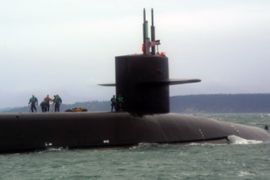US court convicts China ‘spy’
Engineer found guilty of trying to smuggle secret submarine data to China.

Published On 11 May 2007
Prosecutors said he faces a maximum jail term of 35 years when sentencing is handed down in September.
Coded disc
Mak was arrested in October 2005 after US agents swooped on two relatives at Los Angeles Airport as they prepared to board a flight to Hong Kong.
Prosecutors said the duo were caught with a disk containing sensitive encrypted data on US submarines hidden in an English-language CD course.
The 18-month investigation into the engineer began in early 2004, when federal agents began audio and video surveillance of him and his family.
Mak’s wife, his brother, sister-in-law and their son are still facing charges and awaiting trial later this month.
During the trial, he admitted to copying classified documents from his employer, a defense contractor, and keeping copies in his office, but maintained ignorance of the law.
Handlers
|
“We believe the facts of the case have been manipulated, and we believe Mr Mak didn’t necessarily get a fair trial” Ron Kaye, |
Although not an espionage trial, prosecutors painted a shadowy world of intrigue, revealing Chinese intelligence’s use of code names such as Red Flower, Winter Chrysanthemum and Autumn Orchid.
After raiding Mak’s home, prosecutors said they also discovered a ‘wish-list’ of US military technology, including information on missile defense and torpedo systems.
Key to the trial was the government’s allegation that Mak confessed to the conspiracy during an untaped interview in jail two days after his arrest.
Mak denied the confession but said he later admitted to lying about his visits to China and about not having friends or relatives there because he felt intimidated during interrogation.
Ron Kaye, one of the defense lawyers, said they were confident in Mak’s innocence and disappointed by the verdict after a six-week trial.
“We believe the facts of the case have been manipulated, and we believe Mr Mak didn’t necessarily get a fair trial,” he said.
Public document
|
“If this document is in the public domain, why not fax it, email it or send it by mail?” Craig Missakian, |
The parent company of Power Paragon, where Mak was working, testified that he did not need a government license to export the document which he had written and presented at an engineering conference in 2004.
Prosecutors however argued that the US defence department had never approved the data’s release.
“If this document is in the public domain, why not fax it, email it or send it by mail?” Craig Missakian, assistant US attorney, told jurors in his closing submission.
The government could use Mak’s verdict to negotiate plea bargains with other members of his family who are awaiting trial later this month, Greg Staples, assistant US attorney, said.
‘Technology bleed’
The trial comes amid increasing concern in the US about the activities of Chinese intelligence agencies.
A senior US official said in March that Chinese agents were the most active in the world and were aggressively pursuing advanced technology.
“The technology bleed to China, among others, is a very serious problem,” Joel Brenner, head of the Office of National Counterintelligence Executive, told The Washington Times.
Source: News Agencies